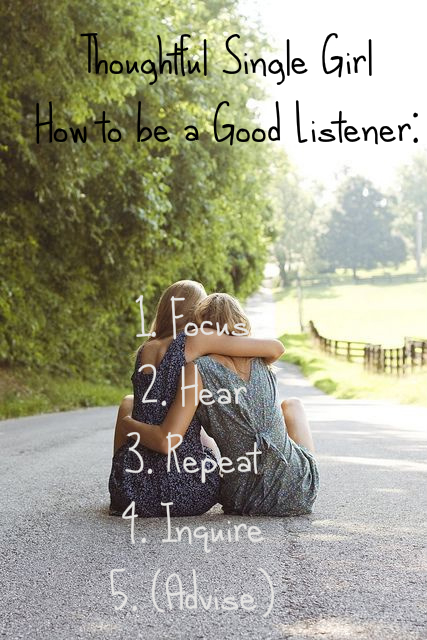Many of us consider ourselves good listeners, but what exactly does that mean?

PHOTO: Pinterest.
In a world of constant “communication,” we are losing our ability to slow down and pay attention. We think conversation is a two-way street merely because anyone with a social media account can have a voice. We are encouraged to form our own opinions, and we often do that in a matter of seconds; is this interfering with the essential skill of listening?
After some practice with meditation and reading a great book on spirituality, I reflected on what it means to listen. I started to notice the lack of it within group conversations: speakers aren’t being heard… people are simply waiting their turn to talk. It’s one thing to be a great conversationalist—someone who can carry on an interesting verbal exchange and keep the other person engaged—and it may be another thing to be a great listener.
When a friend is going through a tough time (a loss in the family, a rough period at work, a break-up), being heard is especially important. We are quick to jump in with our opinion, our advice, our words of wisdom. However, what she may really need from us is simply an ear and a shoulder. If her situation immediately reminds you of your own, you may need to ask yourself: am I listening, or am I just waiting to talk?
Before you allow the wheels to start turning in your head, consider the following.
1. Focus
The simplest of concepts when talking about conversation, but in the age of multimedia concentration on one thing and on one moment is quite challenging. Really pay attention to your friend.
2. Hear
Hear what she’s saying. Comprehend all of it, and take her words at face value… do not let your mind wander the minute she says something that reminds you of a time you went through or something else she’s said in the past.
3, Repeat
A simple way of comprehending (and showing that you comprehend) what she’s saying is to reiterate what you heard in your own words.
4. Inquire
Ask questions. Get clarification. Dig deeper if you think it will be helpful for her to talk it out or for you to better understand her perspective.
5. (Advise)
Once you hear everything she has to say, ask if she wants your advice. This is when you are allowed to share your story (or someone else’s), to help her see the situation from a different perspective, to give your opinion about what to do or whether you think everything will be okay… if and only if she gives her consent.
It’s easy to enter a conversation solely from our own point of view, but being great listeners can make us better friends. Understanding someone else’s story without bias (or as little bias as possible) allows our friends to have a safe place to share and discover themselves and allows us to expand our our worldview.
What skills have you worked on to become a better listener?
Catherine Abalos is founder and editor of The Single Diaries.





























